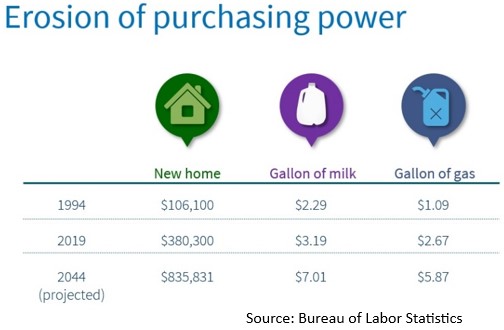How to Get the Most Out of Your Pension Plan
Should you take a lump-sum payout? Do you think your employer is in danger of going bankrupt? These are only two of the issues to consider.


Profit and prosper with the best of Kiplinger's advice on investing, taxes, retirement, personal finance and much more. Delivered daily. Enter your email in the box and click Sign Me Up.
You are now subscribed
Your newsletter sign-up was successful
Want to add more newsletters?

Delivered daily
Kiplinger Today
Profit and prosper with the best of Kiplinger's advice on investing, taxes, retirement, personal finance and much more delivered daily. Smart money moves start here.

Sent five days a week
Kiplinger A Step Ahead
Get practical help to make better financial decisions in your everyday life, from spending to savings on top deals.

Delivered daily
Kiplinger Closing Bell
Get today's biggest financial and investing headlines delivered to your inbox every day the U.S. stock market is open.

Sent twice a week
Kiplinger Adviser Intel
Financial pros across the country share best practices and fresh tactics to preserve and grow your wealth.

Delivered weekly
Kiplinger Tax Tips
Trim your federal and state tax bills with practical tax-planning and tax-cutting strategies.

Sent twice a week
Kiplinger Retirement Tips
Your twice-a-week guide to planning and enjoying a financially secure and richly rewarding retirement

Sent bimonthly.
Kiplinger Adviser Angle
Insights for advisers, wealth managers and other financial professionals.

Sent twice a week
Kiplinger Investing Weekly
Your twice-a-week roundup of promising stocks, funds, companies and industries you should consider, ones you should avoid, and why.

Sent weekly for six weeks
Kiplinger Invest for Retirement
Your step-by-step six-part series on how to invest for retirement, from devising a successful strategy to exactly which investments to choose.
The good news is you have a pension. According to the Bureau of Labor Statistics, only 15% of private industry workers had access to a defined benefit (pension) plan in 2022. And if you are close to retirement, you may be considering at what age to start the income or to take a payout. There are many factors to consider in your decision. Here are a few tips from my 22 years of experience in guiding retirees and executives, adapted from an upcoming webinar (info below).
Inflation is a major concern
Pension income is usually level, meaning it doesn’t increase over time. Once you start the income stream at 65, that could be the same income at age 85, unless your plan offers an inflation adjustment. As comforting as it may sound to have a guaranteed stream of income for life, a dollar today will not be able to buy the same amount in 20 or 30 years.

Don’t underestimate inflation’s effect on your pension income. This may mean waiting longer to take the pension income so you have a larger payout or analyzing a lump-sum option that may have greater growth potential.
From just $107.88 $24.99 for Kiplinger Personal Finance
Become a smarter, better informed investor. Subscribe from just $107.88 $24.99, plus get up to 4 Special Issues

Sign up for Kiplinger’s Free Newsletters
Profit and prosper with the best of expert advice on investing, taxes, retirement, personal finance and more - straight to your e-mail.
Profit and prosper with the best of expert advice - straight to your e-mail.
Pensioners should also consider their life expectancy and their spouse’s life expectancy when deciding how and when to take the income. The longer you or your spouse live, the more you may want to consider waiting to take the income for the higher payout.
Is there company/employer risk?
Ben Franklin once said, “The only thing guaranteed in life is death and taxes.” Notice how he left out pension income? The guarantee is only as good as the company or pension association backing the guarantee. Most large pensions are backed by the Pension Benefit Guaranty Corporation (PBGC). However, there are limits to how much income the PBGC guarantees, and who is to say those limits won’t change?
Buyer beware: Carefully consider the risk your pension may change, be bought out or, worst case, go bankrupt. If you are concerned about the financial viability of your company and don’t want to rely on the PBGC, then that’s a stronger case for taking a lump sum — a bird in hand, as they say.
What about your other assets?
No decision is made in isolation. A client of mine with ample money in a large stock portfolio decided to forgo taking the lump sum and opted for the pension income. She reasoned that she had enough of her portfolio at risk and wanted some guarantees in life. On the flip side, another client decided to take the lump sum — and move the asset tax-free to an IRA — because he wanted to ensure his two children would get the asset if he passed away. Pension income generally stops at the first death if a single-life payout is selected and second death if the joint-life income option is selected.
Of course, there is much more to know, like how does the pension income compare to an annuity? Knowing your pension income ratio helps. Something else to consider: Rising or falling interest rates can impact a pension.
The thing is, while all pensions share some basic similarities, you don’t want to rely too much on generalities, blog posts or an AI chatbot to guide you. There can be subtle differences between each plan.
And, lastly, the decision is generally irrevocable, so you want to get it right. It’s best to have an experienced financial adviser review your pension terms and conditions and develop a customized game plan that takes into consideration your other assets, sources of income and financial goals and risk tolerance.
For more, tune in to our upcoming webinar How to Maximize a Pension – A Planner’s Guide.
Investment advisory and financial planning services are offered through Summit Financial LLC, an SEC Registered Investment Adviser, 4 Campus Drive, Parsippany, NJ 07054. Tel. 973-285-3600 Fax. 973-285-3666. This material is for your information and guidance and is not intended as legal or tax advice. Clients should make all decisions regarding the tax and legal implications of their investments and plans after consulting with their independent tax or legal advisers. Individual investor portfolios must be constructed based on the individual’s financial resources, investment goals, risk tolerance, investment time horizon, tax situation and other relevant factors. Past performance is not a guarantee of future results. The views and opinions expressed in this article are solely those of the author and should not be attributed to Summit Financial LLC. Links to third-party websites are provided for your convenience and informational purposes only. Summit is not responsible for the information contained on third-party websites. The Summit financial planning design team admitted attorneys and/or CPAs, who act exclusively in a non-representative capacity with respect to Summit’s clients. Neither they nor Summit provide tax or legal advice to clients. Any tax statements contained herein were not intended or written to be used, and cannot be used, for the purpose of avoiding U.S. federal, state or local taxes.
related content
- Four Tips to Help You Conquer the Retirement Mountain
- Don’t Have a Pension? The SECURE Act Could Help
- Retirees with a Guaranteed Income Are Happier, Live Longer
- Pension Lump Sum Option vs. Annuity Payment: Which Is Better?
- Can My Pension Trigger a Retirement Tax Bomb?
Profit and prosper with the best of Kiplinger's advice on investing, taxes, retirement, personal finance and much more. Delivered daily. Enter your email in the box and click Sign Me Up.

Michael Aloi is a CERTIFIED FINANCIAL PLANNER™ Practitioner and Accredited Wealth Management Advisor℠ with Summit Financial, LLC. With 21 years of experience, Michael specializes in working with executives, professionals and retirees. Since he joined Summit Financial, LLC, Michael has built a process that emphasizes the integration of various facets of financial planning. Supported by a team of in-house estate and income tax specialists, Michael offers his clients coordinated solutions to scattered problems.
-
 How Much It Costs to Host a Super Bowl Party in 2026
How Much It Costs to Host a Super Bowl Party in 2026Hosting a Super Bowl party in 2026 could cost you. Here's a breakdown of food, drink and entertainment costs — plus ways to save.
-
 3 Reasons to Use a 5-Year CD As You Approach Retirement
3 Reasons to Use a 5-Year CD As You Approach RetirementA five-year CD can help you reach other milestones as you approach retirement.
-
 Your Adult Kids Are Doing Fine. Is It Time To Spend Some of Their Inheritance?
Your Adult Kids Are Doing Fine. Is It Time To Spend Some of Their Inheritance?If your kids are successful, do they need an inheritance? Ask yourself these four questions before passing down another dollar.
-
 The 4 Estate Planning Documents Every High-Net-Worth Family Needs (Not Just a Will)
The 4 Estate Planning Documents Every High-Net-Worth Family Needs (Not Just a Will)The key to successful estate planning for HNW families isn't just drafting these four documents, but ensuring they're current and immediately accessible.
-
 Love and Legacy: What Couples Rarely Talk About (But Should)
Love and Legacy: What Couples Rarely Talk About (But Should)Couples who talk openly about finances, including estate planning, are more likely to head into retirement joyfully. How can you get the conversation going?
-
 How to Get the Fair Value for Your Shares When You Are in the Minority Vote on a Sale of Substantially All Corporate Assets
How to Get the Fair Value for Your Shares When You Are in the Minority Vote on a Sale of Substantially All Corporate AssetsWhen a sale of substantially all corporate assets is approved by majority vote, shareholders on the losing side of the vote should understand their rights.
-
 How to Add a Pet Trust to Your Estate Plan: Don't Leave Your Best Friend to Chance
How to Add a Pet Trust to Your Estate Plan: Don't Leave Your Best Friend to ChanceAdding a pet trust to your estate plan can ensure your pets are properly looked after when you're no longer able to care for them. This is how to go about it.
-
 Want to Avoid Leaving Chaos in Your Wake? Don't Leave Behind an Outdated Estate Plan
Want to Avoid Leaving Chaos in Your Wake? Don't Leave Behind an Outdated Estate PlanAn outdated or incomplete estate plan could cause confusion for those handling your affairs at a difficult time. This guide highlights what to update and when.
-
 I'm a Financial Adviser: This Is Why I Became an Advocate for Fee-Only Financial Advice
I'm a Financial Adviser: This Is Why I Became an Advocate for Fee-Only Financial AdviceCan financial advisers who earn commissions on product sales give clients the best advice? For one professional, changing track was the clear choice.
-
 I Met With 100-Plus Advisers to Develop This Road Map for Adopting AI
I Met With 100-Plus Advisers to Develop This Road Map for Adopting AIFor financial advisers eager to embrace AI but unsure where to start, this road map will help you integrate the right tools and safeguards into your work.
-
 The Referral Revolution: How to Grow Your Business With Trust
The Referral Revolution: How to Grow Your Business With TrustYou can attract ideal clients by focusing on value and leveraging your current relationships to create a referral-based practice.